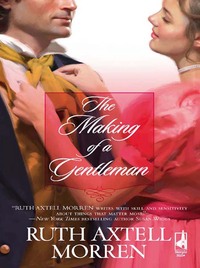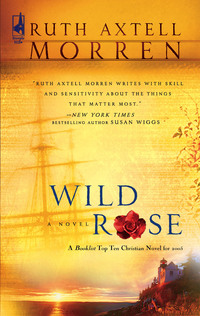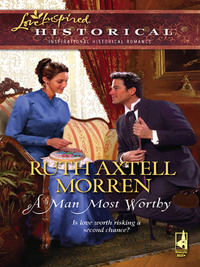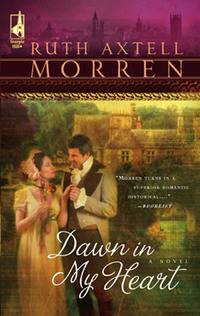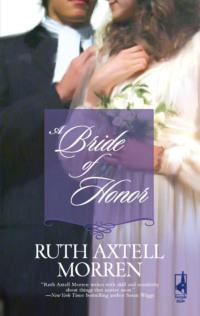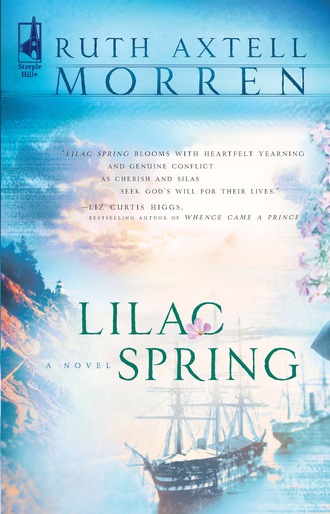
Полная версия
Lilac Spring
“I’m sorry,” he answered. “I just didn’t think it would interest you.” He looked across the meadow to the bay. “The happenings at Winslow’s Shipyard, much less the life of one Silas van der Zee, seemed inconsequential in comparison to the adventures you were having.”
“You were so wrong,” she said quietly. Before he could analyze her serious tone, she began to gather up their things.
“You must have met a lot of interesting people over there,” he said as he helped her, wanting somehow to make up for his delinquent correspondence efforts.
She glanced at him. “Do you really want to know?”
Remembering how she used to tell him everything about her school life, he nodded. “Of course I do.”
“Well, Cousin Penelope must know everyone there is to know on the Continent,” she began, her enthusiasm returning.
He reclosed the jar of tea and handed it to her.
“If Cousin Penelope didn’t know a person she felt worth knowing, she found someone who did and wangled an introduction,” she continued, placing the jar of tea back into the hamper. “Society is very formal across the Atlantic. You can’t just present yourself to someone. An introduction must be arranged.”
She stooped to gather up the tablecloth. Silas stood and took it from her and shook it out away from them.
“Take for example at a dance—excuse me, I mean a ball or an assembly—you can’t just dance with anyone who asks you. You must first be formally introduced.”
She giggled suddenly. “When we were in Vienna, I was requested by a third party to dance a waltz with a certain titled gentleman. He wouldn’t be so bold as to force himself upon the young ‘American demoiselle.’ No, that would be most improper, so he sent an emissary, a female relative—titled, of course. Once I gave her my consent—to an introduction only—he approached and the formal presentation was carried out.”
She took the folded cloth from Silas and laid it atop the picnic basket before facing him and assuming a very straight stance, her hands clasped behind her back. “So, having navigated the appropriate channels, Prince Leopold Christian Otto von Braunschweiger von Black Forest von Wiener Schnitzel von something or other—” the longer she spoke, the thicker grew her false German accent and she bowed low, clicking her heels as she did so “—was presented to me in all the glory of his many family names. I was most impressed, and I gave him my lowest curtsy, like so.”
Silas was laughing at her antics by this time, relaxed once more. She was, after all, the young girl he’d always known. He watched her maneuver an exaggerated curtsy.
“I was afraid my knees would creak, and I almost toppled over—oh goodness!” Here she miscalculated and began to fall forward. Silas stepped into the gap and caught her just in time. She laughed up at him, her hands resting lightly on his shoulders. “Thank you, Silas. I don’t think Prince von Leopold could have been any more agile.” She frowned. “He wore a monocle, you know. It might have popped out if he’d been forced to exert himself so.”
Silas could feel his heart begin to thump heavily as she kept her hands on his shoulders and did not step back.
“Anyway, we are now correctly placed for the waltz. You know it was invented in Vienna? I needn’t summarize the prince’s—or was he a count?—well, anyway, I needn’t go on with his flattering speech. The introduction alone took a good half minute. It was a few more minutes before I realized he was asking me to dance. His accent was so heavy, his circumlocution so flowery, it was quite some time before I realized all he wanted was a waltz.”
Cherish laughed to hide her nervousness. She felt she hadn’t stopped for breath in the past minute, terrified lest Silas disengage himself from her. Now as she looked into his smiling face, she wished she could have an inkling of what he was feeling. Was it anything remotely akin to the way her heart was skittering about in her chest?
She gazed into his gray eyes, her aunt’s words coming back to her. What was going on behind them? They regarded her with that same fond amusement they always had. Was there never to be anything more?
“Come on.” She tugged at his shoulder and took one of his hands from her waist into her own. “I’ll show you the Viennese waltz.”
Then he did react, as she had already begun taking the first step. “I’m not much good at waltzing.”
“It’s simple. I’m planning another party—did I tell you?—and I intend to have dancing this time. But you must lead. One, two, three…one, two, three…” She continued looking into his eyes as she counted. “It’s fatal to look down at your feet. You’re sure to trip then. It’s just a box step, as simple as counting one, two, three. This way—one, then two here, and then one long step, three.” They turned together.
“Yes, you’re doing it.” She began humming a Strauss waltz. “One, two, three. One, two, three. Imagine a hundred chandeliers, sparkling upon the ladies’ ball gowns, and you in a black jacket and starched white shirt with stiff points and white or black tie.” She continued humming, wanting this dance to go on forever.
She laughed when he tripped on a tussock of grass. “You can’t stop, but must find your place once again, or someone might step on my train. The ballroom is packed with dozens of couples….”
Cherish kept up a steady flow of talk, as if by sheer will she could make Silas fall in love with her, feel what she was feeling for him, sense the enchantment of this moment under the cloudless sky in the midst of a field of bluets more glorious than the most radiant Viennese ballroom.
At the noonday dinner Tom Winslow turned to Phoebe when she sat down across the table from him. “Where is Cherish?”
“Out on a picnic with Silas,” she answered him, reaching for a dish of potatoes and taking a helping.
“Out on a picnic?”
“That’s what I said. They went for a sail and a picnic. Now, would you care to serve yourself a slice or two of the corned beef and pass me the platter?”
“What? Oh, yes.” He stabbed the red slices and put them on his plate, then passed the dish to his sister. They finished serving their plates and bowed their heads to say grace. After taking his first bite, Tom chewed thoughtfully. “I don’t know if I like her hanging around with Silas so much. First down at the boat shop and now picnicking together.”
“Silas is a good boy.”
“She’s tagged after him since she was a little girl, always defending him whenever she’s so much as thought I wasn’t treating him right. Now—” here he gave a grunt of incredulous laughter “—she wants me to think of Silas as my successor.”
“You could do a lot worse,” she answered shortly.
Their cutlery clattered against the china as they ate in silence for a while.
“Still, now that Cherish is home, I want her to start meeting some of the men of her own class. Take that young Townsend. I like that fellow. A real gentleman.”
“The question is, does she like him?” Phoebe asked pointedly, prying open her biscuit with the tip of her knife, the steam escaping in a sheer vapor.
That night Cherish knelt by her bed and prayed. Lord, You know how much I’ve always loved Silas. Only You know. Only You know how long I’ve waited for him. I’ve done everything that was expected of me.
Oh, please, Father, make Silas love me back. Let him love me as I love him. I want him so badly. I feel I shall burst with love for him.
Chapter Four
After the Sunday-morning church service, the congregation filed through the entryway, greeting the minister.
“Well, if it isn’t little Cherish Winslow!” Pastor McDuffie took her hand in a hearty handshake. “What a fashionable lady she has become. What do you say, Carrie?” He turned to his wife.
Mrs. McDuffie turned to Cherish with a warm smile. “Welcome back, Cherish. Please forgive us for missing your homecoming. We had to be away that day. We are so happy to have you back in our midst.”
“Thank you. No one is gladder than I am,” she answered.
“Now that you’re back, can we look forward to seeing you with us on Tuesday nights for choir practice? Carrie can certainly use another good singing voice.”
“I would love to come.” She turned to Silas. “You’ll join me, won’t you? We could walk over and back together.”
He fingered his tie. “I’m not much of a singer.”
“Nonsense,” McDuffie contradicted. “You have a fine baritone. I could hear you from the pulpit.”
Cherish smiled at the color creeping up his cheeks. “I hope it didn’t hurt your ears,” he said.
McDuffie laughed. “Au contraire. I was heartened to hear such a good, strong male voice. Just what we need in our choir.” He leaned over to whisper conspiratorially, “We have a surplus of little old ladies, dear souls, whose voices are becoming a mite quavery. We need some new blood.” He gave them both a last firm handshake. “It’s settled, then, come out Tuesday evenings at seven. Good to have you back, Cherish.”
Silas walked home from church with the Winslows as usual for Sunday dinner. Though he had deliberately slowed his steps to avoid walking with Cherish, he found her at his side.
She was a vision of loveliness. In fact, she had been every day he’d seen her since her return. He was beginning to realize he was looking forward to her appearance each day. Today she wore a yellow dress, with flounces and ruches up and down its skirts. A wide yellow sash, tied low on her hips, swayed in the breeze. The tight sleeves of the gown came down to her elbows and her hands were covered with dainty white gloves.
Silas wondered whether it was perhaps because he’d been around men too long, down on the shipyard, that one prettily dressed girl could stir his senses so.
Cherish was chatting away merrily with old Jacob, the Winslows’ handyman and gardener. “I look forward to hearing you fiddling away at the party.”
Silas realized none of the girls of Haven’s End could hold a candle to Cherish. Was it the city polish? Was it that every detail in her appearance was pleasing to the eye? Did women achieve that deliberately, or did it come about naturally?
Cherish’s deep brown hair cascaded down her shoulders in ringlets beneath a little straw bonnet trimmed in yellow ribbons and bows. He remembered her hair caught up in a simple wide ribbon the day they had danced in the meadow, how it had swung around as they’d played at waltzing in a ballroom. She’d been just as beautiful then in her simple frock and hairstyle.
He smiled inwardly at the image. Cherish pretending he and she had been in some elegant Viennese ballroom. Nothing could be sillier. He glanced down at his hands. They were marred by scars of cuts old and new from carpenter’s tools and burns from hot tar, and they felt as rough as the sandpaper he used to make the boats he worked on as smooth as silk.
How did they compare to Prince Leopold’s? Like sandpaper to silk beat a refrain in his mind.
They reached the Winslow house and turned up the drive. Aside from the hotel down by the harbor and the few summer residences, this was the grandest house in Haven’s End.
“I hope you’re hungry,” Cherish told him, her blue eyes laughing up at him. “I was in the kitchen since dawn with Aunt Phoebe until it was time to get ready for church.”
“That right, Miss Cherish?” Jacob piped up. “What goodies you ladies been preparing for us starvin’ menfolk?”
She turned to him. “Roast chicken, mashed potatoes, pickled beets and biscuits.”
“Well, bring it on and we’ll do it proud,” he exclaimed.
After a delicious dinner, in which they all complimented Cherish on her cooking skills, Cherish made Silas promise that he would meet her out on the veranda later.
He usually walked back down to the shipyard after Sunday dinner, but he sat a while making desultory conversation with Mr. Winslow. When the older man took up the paper to read, Silas made his way out to the front porch.
He glanced around and decided to lounge on the two-person swing set at one end of the porch. He swung lazily on the seat, pushing back and forth with the heel of his boot, unaccustomed to idleness. In his free time he was usually whittling away on a ship model or cleaning out his boat.
Just as he felt himself dozing, he heard the front door swing open and footsteps walking toward him. He shook aside the drowsiness and stood to help Cherish with the tray she carried.
“I brought us some lemonade, in case we get thirsty.” She indicated where he should set the small tray down.
“Everything done?”
“All shipshape to Aunt Phoebe’s satisfaction,” she answered, settling herself beside him on the swing with a small leather-bound book beside her. A barn cat, which had come onto the veranda from around the house, jumped onto her lap.
“Hello, puss, where’ve you been all morning? Out hunting mice?” The cat purred smoothly as Cherish stroked its gray fur.
To hide the feelings Cherish’s proximity was creating in him, Silas pushed his feet against the wooden floor, bringing the swing back into motion. They rocked in silence for a few moments, listening to the creak of the swing.
He was just managing to ignore her nearness, his eyes closed, his back resting against the seat, when Cherish asked him, “Do you have a sweetheart these days?”
His eyes snapped open. Cherish sat observing him as her hand caressed the cat’s fur.
“What?” Why was she asking such a question? Simple curiosity—or something more?
“You heard me. Is there anyone occupying a special place in your heart?”
He took his time in answering, unused to such personal inquiries. The men on the yard talked about the ships they were working on, the latest cargo in port, the price of lumber. Mrs. Sullivan made sure he was well fed and clothed and noted if he was looking “peaked.” Mr. Winslow cared only that he reported to work every day and carried out his duties. And all he, Silas, ever thought about was the feel of wood under his hands and the goal he was working toward.
No one had ever asked about his heart. Finally he shook his head. “No.” Why had the answer been so difficult?
“No one since Emma?” she asked softly, referring to his childhood sweetheart from back home.
“I guess I’m married to my boats now.”
“That’s silly. You can’t be married to boats.”
He continued rocking the swing gently, looking down at the toes of his boots. “I haven’t thought about things like getting married, starting a family, or getting a place of my own since Emma passed away.” He spoke the next words slowly, articulating them for the first time. “I guess I decided then that marriage was not for me.”
“That’s nonsense, Silas.” The chiding words were spoken gently.
He shrugged. “I’m content with things as they are. I have my dream, and that’s enough for now.”
“You have a wonderful dream, and I know it will be fulfilled, but that doesn’t mean you can’t want more.”
He glanced at her again, surprised for the second time in the space of a few moments. She did remember his dream.
But she continued speaking, not noticing his reaction. “Love is the highest thing you can experience.”
He said nothing, the word making him uncomfortable.
“You loved Emma.”
“I was just a boy.” His fingers tugged at his collar, trying to think of another topic to distract Cherish.
“Age has nothing to do with it. Just think, you were a boy of twelve and you promised yourself to a girl you’d known all your life, and you loved her faithfully all the years you were here. That’s not childish sentiment. It’s a beautiful, noble thing.”
He turned away from her earnest gaze. “You’ve just become a romantic since seeing all those old castles.”
“Love has nothing to do with seeing castles! I’ve always believed in love. I’ve just become old enough to express my views better now. And there is One Who agrees with me.” She tapped the cover of the book between them. “God. He has a lot to say about love.”
“Yes, I know all about that kind of love…doing unto others….”
She looked away from him. “That sounds like doing your duty. It’s so much more than that. It’s about loving one’s Savior. It’s an all-consuming love He has for us.”
“You sound like Pastor McDuffie.”
Her lips curved slightly. “He’s the one who began making me see that being a Christian was more than just going to church on Sunday or following the Golden Rule. Do you know what I discovered through him?” Her slate-blue irises were rimmed in a deeper hue that was almost black. “How wonderful it is to fall in love with God.”
Silas turned away, her words leaving him feeling inadequate, as if he were missing some vital component in his makeup. The cat had climbed onto his lap, and he touched its fur, feeling the throb of its purr under his fingertips.
“When one realizes the love Jesus poured out for us on that cross, it becomes easy to love Him back with every particle of one’s being, to hold nothing back, to say ‘Yes, Lord,’ when He asks something of us.” She picked up the Bible and hugged it to her breast. “Don’t tell me this is just romanticism. Love is our whole purpose for existing.”
He wasn’t ready to concede any such thing. His mind went to the feel of a boat taking shape under his hands. That was life to him. He pushed the swing back with a jerk.
The cat, disturbed by the motion, got up and jumped to the floor. It stretched its back and sauntered off.
They swung in silence for a while.
Cherish sighed. “God gave us the love between a man and a woman as an—” her hand fluttered out in search of the correct word “—extension of His love for us.”
Again he didn’t know how to answer. “Someone will love you some day, Cherish, with the kind of love you yearn for.”
She tipped her head to one side, regarding him steadily. “Do you think so?”
“I’m sure of it,” he replied, wondering who that man would be and realizing he couldn’t conjure up any image of the man who would be good enough for her.
“I hope you’re right,” she answered him, and set the book on her lap. “Don’t you want to be loved again? The way Emma loved you?”
Her eyes searched his, and he had a fleeting sense of how much more wrenching and painful the death of a loved one would be to a man than to a boy. He turned away from Cherish and looked down the lawn toward the inlet beyond. The tide had filled it, just as Cherish’s words had filled his mind without any conscious resistance on his part.
“I never think about it,” he answered honestly. “I was awfully young—we both were—when Emmy and I ‘pledged our troth.’ Then we just kept the promise, although we didn’t see each other but just once a year after I came up here for my apprenticeship.
“When I turned nineteen, I asked your father for permission to get married. Although I’d already fulfilled the terms of my apprenticeship and didn’t really need his consent, he counseled me to wait until I was at least twenty-one, with more money saved up.”
He looked straight ahead to some indefinite point in the center of the painted porch floor. “His advice made sense. At that age you don’t expect to lose someone younger than yourself, just like that, even though we go through it all the time. I’d already lost an older brother and sister, and my father never came back from the Grand Banks.”
He cleared his throat, the recollection of those days coming back to him as he spoke about them. “Then she got rheumatic fever and died, just a month shy of my twenty-first birthday.” He’d felt bitter about it for a long time. Just when it had faded, he didn’t know.
“Do you still miss Emma after all these years?”
He shook his head slowly. “It’s as I said—I guess I’m married to boats now.”
“You know I love you, Silas.”
He lifted his gaze to hers, her words arresting him.
Before he could figure out what she meant, she asked softly, “Don’t you love me?”
Her big blue eyes waited for his answer. He could feel himself redden. He rubbed the back of his neck, at a loss for an answer. How was he supposed to answer such a question? Was she talking about their old familiar affection for each other, developed over the years? Or that sublime sentiment she had been describing to him? He managed to tear his gaze away.
“Well…uh…yes.”
“You don’t have to say it as if you’re going to choke on it!”
His face grew warmer. “I’m not! Of course I love you. I’ve known you since you were a little girl. You’re like a sister to me.”
When he looked at her again, she was gazing away from him.
He felt the weight of responsibility. Cherish trusted him. Winslow trusted him. How could he live up to that trust when he found himself yearning to kiss those sweet lips inches from him?
Silas lay on his bed, hearing the lap of the waves below boxing him in. He could no longer push aside Cherish’s question. Don’t you love me?
She’d said I love you in her frank, childlike way. She loved the boy who’d come to Haven’s End fourteen years earlier. But it was a naive, girlish emotion that would soon pass once she’d been back a while and realized Silas van der Zee was the same uneducated man she’d left two years ago, who’d never been beyond this coast, who never could come anywhere near the kind of gentlemen she’d met in her travels. Soon she’d outgrow her childish fancy and turn admiring woman’s eyes on someone like Warren Townsend.
But what about Silas himself? Don’t you love me? Why did the question make him squirm like a pale grub dug out of the dark, damp earth and exposed to the unfamiliar light and air?
What did he know of love? Did he even know how to love?
He loved boats. He could hold on to that one fact. He loved the feel of smooth wood emerging from the sanding, knowing it was something tangible, something he could force and shape and tame. He loved the look of a rift-sawn timber with its straight grain, knowing its superior strength, its unlikeliness to cup or warp in the water. He loved the smell of cedar and oak and pine that permeated the boat shop even up to his room, the only home he’d known for the past fourteen years.
He loved the challenge of taking straight, strong, unbending logs and cutting and shaping them into a buoyant craft. He loved the triumph of seeing that craft ply through the waters, daring that depthless expanse of waves, defying nature itself when it brought even the wind to do its bidding through that mathematical precision of setting sails at a certain angle to move forward.
He loved the challenge, the speed, the feel of that maiden, the sailing vessel.
But loving a woman—a real, flesh-and-blood woman? Silas sat up, his elbows on his knees, his chin on his fists, too uncomfortable with the question to lie still. Again he felt unable to respond, as if he were untaught or immature in this aspect of the organ called the heart. It seemed to him it had stopped developing when he was twelve and had left home.
He still remembered waving goodbye as his boat pulled away from the harbor. Little Emma, come to see him off, holding his mother’s hand. His mother, still looking lost, as she had since she’d received the news that his father wasn’t coming back from his fishing expedition. And his older sister with her harsh, Nordic looks prematurely middle-aged although she was only in her twenties, since she’d had to take over the running of the household.
Silas had been one of the last of the siblings to leave home. Almost all the others, older, had already found employment elsewhere.
So Silas had arrived at Winslow’s Shipyard and his heart had given itself over to boats. He’d lived among men and boats ever since. The only women he’d had contact with had been Cherish’s mother, a kindly, beautiful woman, and the plainer, more acerbic Mrs. Sullivan. With both, their conversation had been limited to Wash your hands, Silas. Wash your face. Don’t forget to scrub behind your ears. Clean your plate, Silas. Get your elbows off the table.
And then there had been Winslow’s cherished daughter, radiant and outgoing and sensitive to his every mood.






